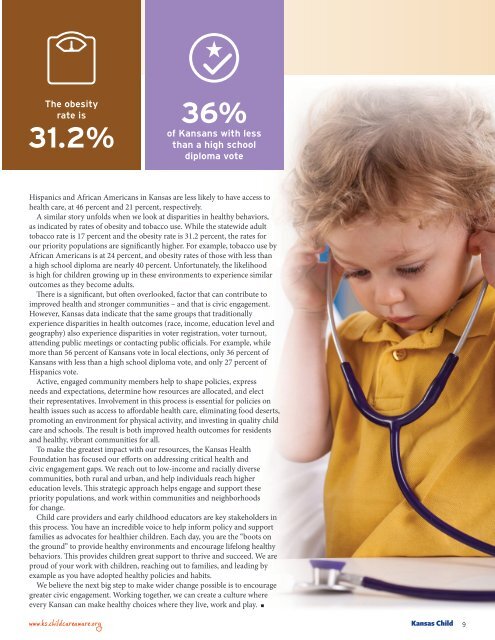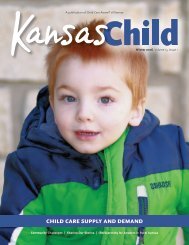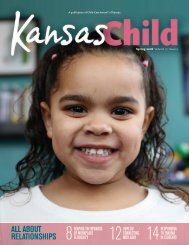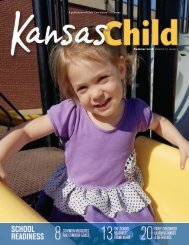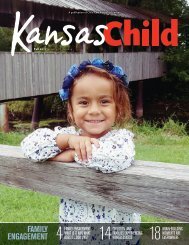2018 Winter Kansas Child
Public Health
Public Health
- No tags were found...
You also want an ePaper? Increase the reach of your titles
YUMPU automatically turns print PDFs into web optimized ePapers that Google loves.
The obesity<br />
rate is<br />
31.2%<br />
36%<br />
of Kansans with less<br />
than a high school<br />
diploma vote<br />
Hispanics and African Americans in <strong>Kansas</strong> are less likely to have access to<br />
health care, at 46 percent and 21 percent, respectively.<br />
A similar story unfolds when we look at disparities in healthy behaviors,<br />
as indicated by rates of obesity and tobacco use. While the statewide adult<br />
tobacco rate is 17 percent and the obesity rate is 31.2 percent, the rates for<br />
our priority populations are significantly higher. For example, tobacco use by<br />
African Americans is at 24 percent, and obesity rates of those with less than<br />
a high school diploma are nearly 40 percent. Unfortunately, the likelihood<br />
is high for children growing up in these environments to experience similar<br />
outcomes as they become adults.<br />
There is a significant, but often overlooked, factor that can contribute to<br />
improved health and stronger communities – and that is civic engagement.<br />
However, <strong>Kansas</strong> data indicate that the same groups that traditionally<br />
experience disparities in health outcomes (race, income, education level and<br />
geography) also experience disparities in voter registration, voter turnout,<br />
attending public meetings or contacting public officials. For example, while<br />
more than 56 percent of Kansans vote in local elections, only 36 percent of<br />
Kansans with less than a high school diploma vote, and only 27 percent of<br />
Hispanics vote.<br />
Active, engaged community members help to shape policies, express<br />
needs and expectations, determine how resources are allocated, and elect<br />
their representatives. Involvement in this process is essential for policies on<br />
health issues such as access to affordable health care, eliminating food deserts,<br />
promoting an environment for physical activity, and investing in quality child<br />
care and schools. The result is both improved health outcomes for residents<br />
and healthy, vibrant communities for all.<br />
To make the greatest impact with our resources, the <strong>Kansas</strong> Health<br />
Foundation has focused our efforts on addressing critical health and<br />
civic engagement gaps. We reach out to low-income and racially diverse<br />
communities, both rural and urban, and help individuals reach higher<br />
education levels. This strategic approach helps engage and support these<br />
priority populations, and work within communities and neighborhoods<br />
for change.<br />
<strong>Child</strong> care providers and early childhood educators are key stakeholders in<br />
this process. You have an incredible voice to help inform policy and support<br />
families as advocates for healthier children. Each day, you are the “boots on<br />
the ground” to provide healthy environments and encourage lifelong healthy<br />
behaviors. This provides children great support to thrive and succeed. We are<br />
proud of your work with children, reaching out to families, and leading by<br />
example as you have adopted healthy policies and habits.<br />
We believe the next big step to make wider change possible is to encourage<br />
greater civic engagement. Working together, we can create a culture where<br />
every Kansan can make healthy choices where they live, work and play. n<br />
www.ks.childcareaware.org <strong>Kansas</strong> <strong>Child</strong> 9


